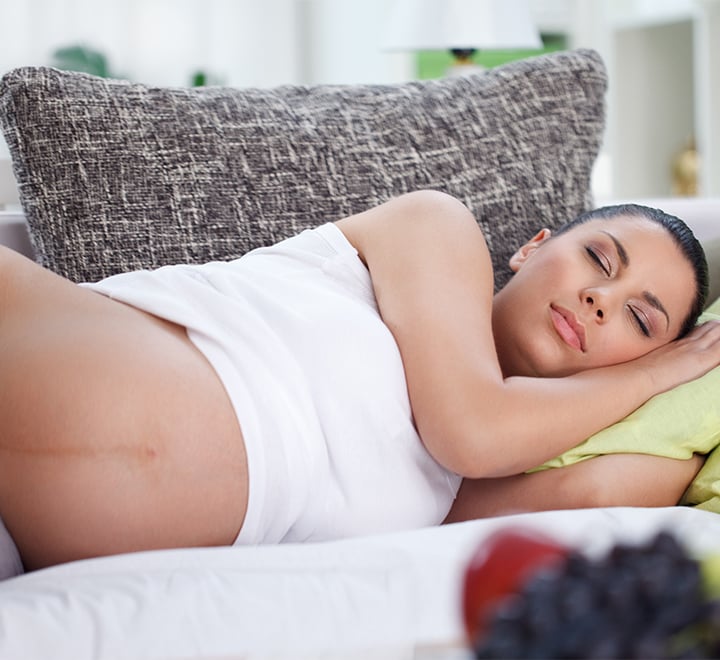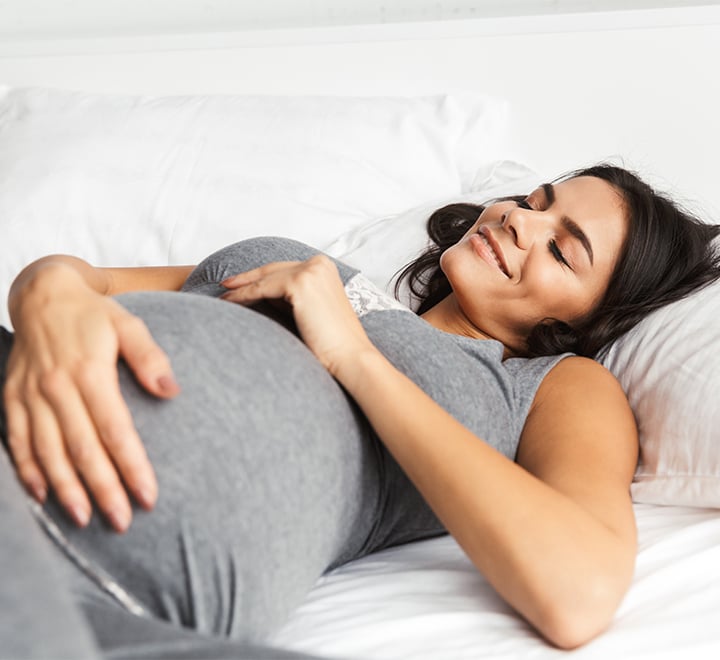Managing Sore Hips When Sleeping During Pregnancy for Better Sleep
Experiencing hip pain when sleeping during pregnancy? Don't let it rob you of a good night's rest! While getting sore hips in pregnancy is common (around 32% of pregnant women experience it), it can still disrupt your snoozing schedule.
As your body adjusts to accommodate your growing baby, you may experience discomfort in various areas, including your hips. But there are ways to manage this discomfort and improve your quality of sleep. After all, you need to get as much sleep as you can now before the sleepless nights of caring for a newborn begin!
We’re here to help put a stop to any worries and discomfort you may be experiencing with our tips for managing sore hips when sleeping during pregnancy*.


Is it Normal to Experience Hip Pain During Pregnancy?
Yes, hip pain is quite common during pregnancy.
As the body prepares for childbirth, it releases the hormone relaxin, which loosens the ligaments in the pelvic area. This can lead to instability and discomfort, particularly in the hip region.
Also, the growing weight of the baby places more pressure on the hips, which can also contribute to soreness and pain. So don't worry. The discomfort you're feeling is entirely normal.
Disclaimer: If you're experiencing sudden or worsening hip pain, seek medical advice as soon as possible to rule out other medical causes.

The Connection Between Hip Pain & Pregnancy
The connection between pregnancy and hip pain is primarily a result of the profound physiological changes that occur in a woman's body during this transformative time. As the body prepares to nurture and support a growing life, ligaments and joints begin to loosen.
This natural process, while necessary for childbirth, can lead to discomfort in the hips as the weight distribution shifts and the pelvic area expands.


Pregnancy Hormones & Hip Pain
Hormones play a crucial role in preparing a woman's body for childbirth, but they can also be a source of discomfort.
During pregnancy, the body increases the production of the hormone relaxin, which helps to relax the ligaments in the pelvis to accommodate the growing baby and aid in the delivery process.
While relaxin's effects are beneficial for childbirth, they can also cause the hips to become less stable, leading to pain and soreness.

Our Tips for Relieving Hormonal Hip Pain
Gentle stretching is a helpful way to alleviate the hormonal hip pain associated with pregnancy. By regularly engaging in stretches, you can increase the flexibility and strength of your muscles, which support the joints and can lead to a reduction in pain levels.
For example, the 'Pregnancy Hip Stretch', where you stand arm's length from a wall, cross one foot over the other and lean towards the wall, can significantly aid in relieving hip tension.
Another beneficial stretch is the 'Butterfly Stretch', which targets the hips by sitting on the floor with the soles of your feet together and gently pressing your knees down with your elbows.
These stretches, done with proper form and breathing, can contribute to easing the discomfort caused by the relaxin hormone during pregnancy.

Changes to Your Posture During Pregnancy
The alterations that your body undergoes during pregnancy can significantly affect your posture. As the baby grows, the centre of gravity shifts forward, often causing expectant mothers to adjust their posture unconsciously.
Leaning back or over-arching the spine to compensate for the change in weight distribution is common. This compensation can lead to an increased strain on the hips, causing soreness and discomfort.
When the pelvis tilts forward, the hip joints may be forced into unnatural positions, aggravating the pain during a period when the ligaments are already looser due to hormonal changes.
- Support your back: Use a small pillow or cushion for lumbar support when sitting to encourage proper spinal alignment and relieve pressure on the hips.
- Stay balanced: Distribute your weight evenly on both legs when standing; avoid locking your knees.
- Choose appropriate footwear: Opt for low-heeled shoes with good arch support to help maintain balance and avoid extra stress on your hips.
- Swim for symmetry: Engage in swimming or water aerobics to help evenly work out your back and abdominal muscles, which can improve posture and decrease hip pain.
- Prenatal yoga: Participate in prenatal yoga classes that focus on postural alignment, strengthening, and flexibility—specifically poses that target the spine and pelvis.
Consistent implementation of these tips can contribute to better posture, alleviating the strain on your hips as your body changes to support your growing baby.

Limited Pregnancy Sleeping Positions
As pregnancy progresses, the comfortable range of sleeping positions can narrow significantly, often limiting expectant mothers to side-sleeping.
This can increase the pressure on the hips, exacerbating pain due to the additional weight of the growing uterus bearing down on these joints. Consequently, finding a supportive sleeping position becomes crucial for pain relief and better rest.
- Use support pillows: Pregnancy support pillows can be a lifesaver for sleeping comfortably. They’re designed to cradle the body and provide support in all the right places to alleviate pressure on the hips and other joints.
- Side sleeping on the left: The left side is the best position for blood flow and nutrient delivery to your baby; use pillows for back support to prevent rolling onto your back.
- Elevate your upper body: A few pillows under your upper body can help with heartburn and breathing, common issues during pregnancy.
- Stretch before bed: Gentle stretching before bed can relax your muscles and lead to a more comfortable night's sleep.
- Regular movement: Staying active during the day can prevent stiffness and reduce discomfort at night.
- Create a relaxing routine: Wind down with a warm bath, some light reading, or relaxation exercises to prepare your body for sleep.
Remember, these suggestions are not a substitute for medical advice, so it's important to consult with your healthcare provider about any persistent sleep or hip pain issues.
- Severe pain
- Pain that disrupts your daily life
- Sudden swelling
These can be signs of more serious conditions, such as symphysis pubis dysfunction (SPD) or preterm labour. If pain persists despite trying self-management strategies, a medical evaluation is necessary to ensure both your well-being and that of your baby.


1) OTC Medications
Over-the-counter (OTC) pain relievers may provide relief for hip pain during pregnancy, but it's important to consult your doctor before taking any medications.
Paracetamol is generally considered safe for pregnant women and can help manage mild to moderate pain.
However, it's best to avoid Nonsteroidal Anti-Inflammatory Drugs (NSAIDs) like ibuprofen, especially during the third trimester, as they may affect the baby's circulation and kidneys.
Always ensure that any treatment, including OTC medications, is approved by your healthcare provider for the safety of both you and your baby. Your doctor will provide the best guidance for managing your hip pain during pregnancy.

2) Warm Compresses
Applying a warm compress can soothe hip and back pain during pregnancy by increasing blood flow, reducing muscle tension, and easing joint stiffness. This gentle heat helps relax the affected area, offering temporary relief from discomfort.
Always check the temperature to ensure it's warm, not hot, to avoid skin irritation and be mindful to apply heat for short durations.

3) Stretches & Exercises
Stretches and exercises specifically designed for pregnancy can strengthen the muscles supporting the hips, improving stability and reducing pain.
Regular gentle movement increases joint flexibility and blood circulation, helping to alleviate aches and pains. Always practice with caution and consult a healthcare professional before starting any new routine.

4) A Pelvic Belt
A pelvic belt, or maternity support belt, can effectively alleviate hip discomfort by providing stabilisation for the pelvis. It gently compresses the area, distributing the weight of the growing belly more evenly and reducing the strain on hip joints.
This support helps to maintain better posture and can lessen pain, especially when walking or standing for extended periods.

5) Sleep Aids
Sleep aids like pregnancy pillows provide critical support for the growing belly, ensuring proper alignment of the spine and hips during rest.
Their design alleviates the pressure on the hips, reducing pain and allowing for longer periods of uninterrupted sleep, which is essential for both maternal and fetal health.

Summary: How to Manage Hip Pain When Sleeping During Pregnancy
Managing hip pain during pregnancy can be difficult, but through stretches, proper posture, supportive sleep aids, and safe pain relief methods, you can find significant relief from discomfort.
We have to stress how important it is to listen to your body's signals and consult with healthcare professionals when needed. But if you want more advice about alleviating hip pain during pregnancy, check out our blog about Sleeping Safely & Comfortably with Your Bump: Trimester by Trimester.
*The advice given in this blog shouldn't replace regular checkups and appointments with your OB/GYN or GP. If you experience a sudden change in your symptoms, seek medical advice right away.
FAQs
Yes, pregnancy pillows can be very helpful for hip pain. They provide support and help maintain alignment of the spine and pelvis during sleep, which reduces pressure on the hips and can alleviate discomfort.
To reduce hip pain when sleeping during pregnancy, use pregnancy pillows for support, place a pillow between your legs to maintain hip alignment, engage in prenatal stretches before bed, and alternate sides periodically to distribute pressure evenly.
Hips can start to widen during the first trimester due to the relaxin hormone but often become more noticeable in the later stages, around the second to the third trimester, as the body prepares for childbirth.
Hip bursitis during pregnancy is an inflammation of the bursae, the fluid-filled sacs near the hip joint. It causes sharp or aching hip pain that can be exacerbated by prolonged standing or climbing stairs. It may be due to increased stress on the joints during pregnancy or continuing an active lifestyle. Always consult with a healthcare provider for proper diagnosis and treatment.
Stretching your hips during pregnancy can be safely done with exercises like the Butterfly Stretch, Pelvic Tilts, and Prenatal Yoga poses. Focus on gentle movements and avoid deep or forceful stretches. It's advisable to consult with your healthcare provider before beginning any new stretching routine.



























